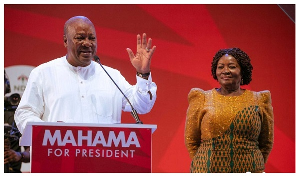 John Dramani Mahama and Prof. Naana Jane Opoku-Agyemang
John Dramani Mahama and Prof. Naana Jane Opoku-Agyemang
We all know that women are the backbone of our nation, but many politicians only seem to remember us around election time.
We have been through many election cycles, with endless promises directed towards women, but few have delivered.
Nevertheless, in this election we see something historic and entirely possible. If former President John Mahama wins, then we will see our first-ever female Vice President Professor Jane Naana Opoku-Agyemang.
Professor Opoku-Agyemang was not placed in her position simply because of her gender, but because throughout her career she has broken glass ceilings and advocated for women’s issues nationally and internationally.
She served as the first female Vice-Chancellor of a state university in Ghana when she took over as Vice-Chancellor of University of Cape Coast. Her areas of focus have included Literature with a focus on Women from Ghana.
Professor Opoku-Agyemang’s commitment to advancing women’s rights is deeply rooted in her extensive academic and administrative career. With her background as a former Minister of Education and a respected scholar, she has consistently highlighted the importance of education as a powerful tool for women’s advancement.
Her advocacy for equal access to quality education has transformed countless lives, particularly in underserved communities where girls often face systemic barriers.
Beyond her work in education, Opoku-Agyemang has been a vocal advocate for gender equity in political representation.
Her candidacy in the elections is not merely a historic moment for Ghana; it was a clarion call for women to take their rightful place in leadership. By navigating the challenges of political life with grace and tenacity, she has inspired a new generation of women to engage in politics and pursue their ambitions fearlessly.
On the international stage, Professor Opoku-Agyemang has contributed to crucial dialogues on women’s rights, addressing issues such as gender-based violence, economic inequality, and the urgent need for policy reforms. Her work emphasizes that the fight for gender equality is not confined to national borders; it is a global movement requiring solidarity and collective action.
If she enters the Vice President’s Residence, she will embody the necessary spirit of change. Her relentless pursuit of gender equity will empower women, not just as a matter of justice, but as an essential element for the sustainable development of our societies.
Furthermore, Mahama’s choice of Professor Opoku-Agyemang is no fig leaf or aberration.
The government of Ghana with the highest representation of women was during the previous tenure of President John Mahama from 2012 to 2016. His administration saw a notable increase in the number of women in key government positions, including the appointment of several female ministers. This emphasis on gender inclusion was part of a broader commitment to promoting women’s rights and participation in governance.
In fact, during President Maham’s Government, there were more women serving as ministers than at any other time in Ghana’s history.
John Mahama also has a bold vision for women in Ghana and understands their needs.
He has already committed himself to mandating a minimum 30 per cent quota for women in all political appointments, something he has easily achieved in the past, unlike the current president.
A Mahama-led government will establish a Women’s Development Bank, a special-purpose bank run by women to support women-owned, and women led businesses with low-interest loans and other tailored financial services on very flexible terms. This is aimed at the economic empowerment of millions of Ghanaian women, something crucial for us to get out of the economic disaster we are currently facing.
He is also committed to the establishment of 16 regional shelters with comprehensive support services for victims of gender-based violence, developing a ‘Survivors Care Kit’ for victims of gender-based violence, including free legal services, medical examinations, emergency contraception, HIV prophylaxis, mental healthcare services and necessary medications, and disseminating free sanitary pads for female students in basic and secondary schools.
This is clearly a progressive agenda laid out by someone who works with and most importantly, listens to women and their needs, not as a political goal but out of a genuine desire to see in the increase of women’s prosperity, security and equality.
If John Mahama wins the upcoming elections, then the women of Ghana will prosper and finally have an equitable seat at the table.
This will be a historic moment for us.